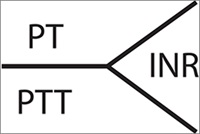Expand All
Collapse All
What does PT/INR stand for?
Toggle
Prothrombin Time / International Normalized Ratio
The INR is calculated using the following formula and is a ratio of Prothrombin Times that providers or pharmacists use to adjust your warfarin dosage.
Prothrombin Time or Protime - Measures the amount of time, in seconds, that it takes for your blood to clot.

- PT Patient = Patient’s measured PT (seconds)
- PT Normal = Laboratory’s geometric mean value PT for normal patients not on warfarin (seconds)
- ISI = International Sensitivity Index (1.0)
- PT= Prothrombin Time (number of seconds it takes blood to clot)
What is the normal INR range?
Toggle
A person taking the anticoagulant (blood thinner) “Jantoven” or “Warfarin” should maintain an INR within the safe therapeutic range prescribed by their doctor. Most commonly patients will be prescribed a therapeutic range of (INR) 2.0 – 3.0 and patients with a mechanical heart valve will often have a therapeutic range that is higher than this.
A person NOT taking anticoagulants should have an INR range between 0.8 to 1.2.
What is PT/INR Home Testing?
Toggle
What are the benefits of PT/INR home testing?
Toggle
Home monitoring can mean:
- Control - better management of your time & care
- Convenience - less need for warfarin specific provider's visits
- Savings - of time and money
- More Frequent Testing - which may mean a greater chance you are "therapeutic".
- More Data - so your provider has more information to guide your treatment.
- Faster Interpretation of Results - abnormal results are reported to your healthcare provider, therefore dosing adjustments may be made faster, possibly preventing complications.
Is PT/INR self-testing covered by Medicare?
Toggle
Effective March 19, 2008, Medicare covers weekly self INR monitoring for eligible patients on long term warfarin therapy for the management of patients with 1) mechanical heart valves, 2) chronic atrial fibrillation and 3) venous thromboembolism (inclusive of deep venous thrombosis and pulmonary embolism).
For eligible beneficiaries, Medicare covers 80% of the service once the annual Medicare deductible has been satisfied. The service includes all necessary testing equipment (meter loan, ongoing supply of test strips and lancets) needed in order to obtain a weekly INR test result. Nothing is billed to Medicare for the service until 4 successful test results have been reported to ACS® and transmitted to the provider for interpretation.
Most secondary or supplemental insurance plans will cover the remaining 20% co-insurance. This is subject to your specific insurance plan/policy.
What is the cost of PT/INR home testing?
Toggle
The cost for PT/INR Self-Testing will vary depending on your insurance coverage. Our insurance professionals will check eligibility with your insurance carriers and provide you with a summary of covered services and out-of-pocket expenses.
- Medicare - Medicare recently expanded coverage for PT/INR Self-Testing for patients with Atrial Fibrillation, Mechanical Heart Valves, and Deep Vein Thrombosis. If you meet coverage Medicare will cover most of the cost of PT/INR Self-Testing.
- Secondary Insurance - We will work closely with your secondary private insurer to attempt to reduce or eliminate any additional out-of-pocket expenses.
- Private Insurance - Some private insurers will cover service for PT/INR Self-Testing. Our knowledgeable insurance experts will work directly with your insurance company to determine your eligibility.
- Self-Pay - We offer self-pay options to qualified patients.
Who is eligible for home PT/INR testing?
Toggle
For insurance reimbursement, you must be diagnosed with one of the following:
- Chronic Atrial Fibrillation
- Mechanical Heart Valve
- Deep Vein Thrombosis (DVT)
- Pulmonary Embolism (PE)
- Primary Hypercoagulable State
Patients must also:
- Have been taking warfarin for at least 3 months (90 days) prior to use of the home INR device.
- Undergo a face-to-face training by a certified trainer on how to use the meter and report test results.
- Demonstrate (or caregiver must demonstrate) proper use of the device following the end of training.
- Be on long term warfarin therapy and not planning on switching to any other anticoagulants.
Does my insurance cover weekly home testing?
Toggle
For beneficiaries meeting coverage criteria weekly PT/INR self-testing is a Medicare covered benefit paying 80% of the services rendered after the annual deductible is met.
If you have a secondary supplemental insurance, they generally cover the remaining 20%.
If you only have Medicare, then you are responsible for the annual Medicare deductible and once satisfied the remaining 20% co-pay. This applies to the one-time training, and monthly service which includes all necessary testing supplies along with reporting results to your provider or clinic for interpretation.
Most private insurances will cover home INR testing and our insurance team can provide you with an estimate of benefits prior to service.
What are the benefits of weekly home testing vs. monthly lab testing?
Toggle
This preventative measure can result in a lower risk for stroke and internal bleeding, keeping you safe and out of the hospital.
What is my therapeutic range?
Toggle
How does my provider get my results?
Toggle
How do I get more PT/INR test strips and lancets?
Toggle
As long as you are testing your INR weekly and call ACS® with any testing errors, you will automatically receive testing supplies delivered directly to your home. We do our best to ensure that you always have at least two or three test strips on hand to account for potential errors or extra testing. In order to make sure that we ship more test strips and lancets to you in time it is important to report your errors and/or let us know when you are down to 3 strips by calling ACS® at 800-231-2290 or e-mail us at ContactACS@Lincare.com.
If you will be going out of town for an extended period of time or will be moving, please contact us a few weeks ahead of time so that we can update your account and ensure you will have plenty of supplies to test with.
Who trains me how to use my PT/INR meter and report results?
Toggle
Who do I call if I have questions?
Toggle
Can I still be tested in my provider’s office if I start home PT/INR testing?
Toggle
What if I am testing more frequently than once a week?
Toggle
Who do I contact if I need help with testing my INR?
Toggle
Our main focus is to ensure that you are successful with your INR self-testing and we are here to assist you every step of the way. If you receive any errors while testing your INR please stop, make note of the error number, and call Advanced Cardio Services at 800-231-2290. A team member will help you trouble shoot what is being done wrong and give suggestions on how to correct your testing technique. It is common to receive a few errors on your first few self-tests following your training but with our help you’ll be a pro in no time.
Advanced Cardio Services’ highly trained customer care representatives are available to assist you from 7:30 AM to 5:30 PM (CST) Monday through Friday. If you need assistance outside of our business hours you can contact the 24-7 Technical Support line at 800-231-2290.
What is coagulation?
Toggle
What are anticoagulants?
Toggle
Why should people who take daily anticoagulation medication now consider testing their PT/INR levels once a week when once a month used to be often enough?
Toggle
Why are more providers recommending that their patients self-test?
Toggle

